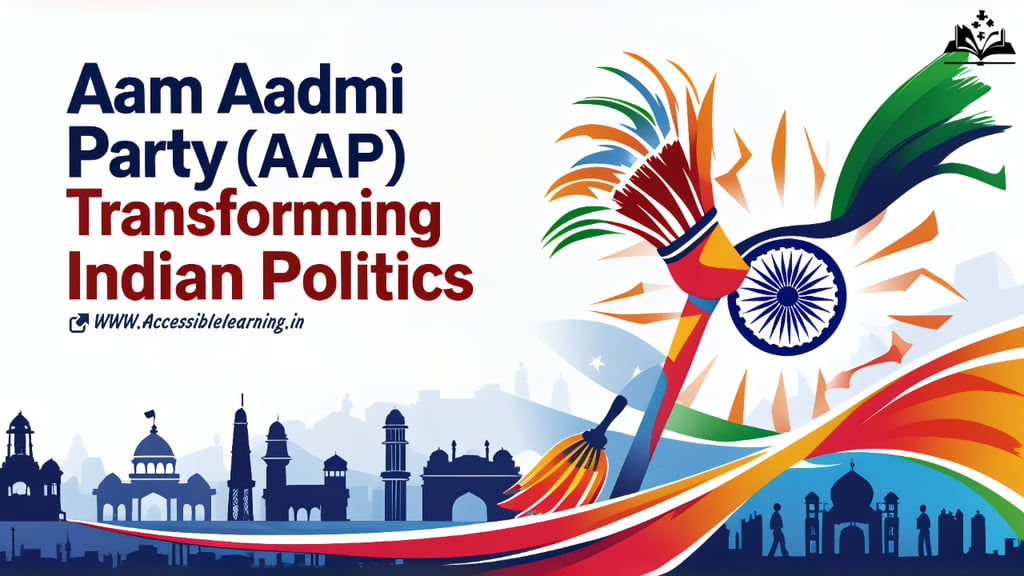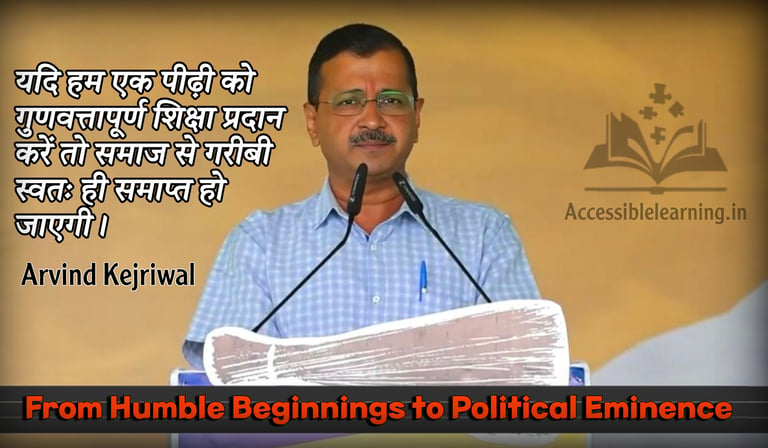
How the Aam Aadmi Party is Redefining Indian Democracy!
Explore the inspiring journey of the Aam Aadmi Party (AAP), its grassroots origins, transformative governance model, key achievements, challenges, and its growing impact on Indian politics. Discover how AAP is redefining democracy and shaping the future of governance in India.
POLITICAL JOURNEYBIOGRAPHYAAPEDUCATION/KNOWLEDGE
Sachin K Chaurasiya
1/23/20255 min read


The Aam Aadmi Party (AAP), translated as the "Common Man's Party," is a political movement that has redefined the contours of Indian politics. Born from the anti-corruption fervor that swept across India in the early 2010s, AAP has emerged as a beacon of hope for millions of Indians seeking clean governance, accountability, and a focus on grassroots development. In this article, we will explore the origins, ideology, achievements, challenges, and impact of AAP on India's political landscape.
The Genesis of AAP
The Aam Aadmi Party was officially launched on November 26, 2012, by Arvind Kejriwal, a former Indian Revenue Service (IRS) officer turned social activist. The party emerged as a political extension of the India Against Corruption (IAC) movement, which gained nationwide traction under the leadership of Anna Hazare. Kejriwal, disagreeing with Hazare's apolitical stance, believed that systemic change could only be achieved by entering the political arena.
AAP's foundation was built on the principles of transparency, accountability, and the fight against corruption, resonating deeply with India's middle and lower-middle classes, who were disillusioned by traditional politics.
Core Ideology and Vision
Anti-Corruption: Rooting out corruption from governance.
Participatory Democracy: Empowering citizens through mechanisms like Mohalla Sabhas (community councils).
Welfare-Oriented Governance: Ensuring equitable access to education, healthcare, and basic services.
Transparency and Accountability: Making governance processes open and citizen-friendly.
Environmental Sustainability: Introducing policies that address climate change and urban environmental challenges.
Key Achievements
AAP's track record, particularly in Delhi, has been marked by innovative policies and governance models. Some of its most notable achievements include:
Revolutionizing Education
AAP has transformed the public education system in Delhi, upgrading infrastructure and introducing training programs for teachers.
The party’s government schools have outperformed many private schools in board exam results.
Programs like the "Happiness Curriculum" and "Entrepreneurship Mindset Curriculum" have garnered international recognition.
Initiatives such as "Desh Ke Mentor" aim to guide students in their career paths by connecting them with professionals.
Healthcare Reforms
The introduction of Mohalla Clinics, neighborhood health facilities, has made primary healthcare affordable and accessible to millions.
Focus on preventive care and diagnostics has been lauded internationally.
The Delhi government’s "Farishtey Dilli Ke" scheme covers accident victims’ medical costs to ensure timely treatment.
Affordable Electricity and Water
Subsidized electricity and free water schemes have eased the financial burden on Delhi's residents.
AAP claims these measures are funded through savings from eliminating corruption.
Infrastructure Development
Expansion of Delhi’s public transport system and road infrastructure.
Development of high-quality pedestrian-friendly spaces and improvements to the drainage system.
Women’s Safety and Welfare
Free bus rides for women in Delhi’s public transport system.
Installation of CCTV cameras across the city to improve safety.
Environmental Initiatives
Implementation of the "Odd-Even" vehicle rationing scheme to combat air pollution.
Promotion of electric vehicles and tree-planting drives.
Establishment of the "Green War Room" to monitor and address environmental issues in Delhi.
Employment and Skill Development
Vocational training programs for youth.
Start-up initiatives to promote entrepreneurship.
Partnerships with private organizations for skill development and job creation.
Social Justice Initiatives
Financial support for marginalized communities through various welfare schemes.
Efforts to regularize unauthorized colonies, providing land rights to millions of residents.


Electoral Success
AAP's debut in the 2013 Delhi Assembly elections was a resounding success, as it won 28 out of 70 seats, forming a minority government. Although it resigned after 49 days due to its inability to pass the Jan Lokpal Bill, the party bounced back in the 2015 elections, securing an unprecedented 67 out of 70 seats. The victory signaled AAP’s acceptance as a credible alternative to established parties.
In the 2020 Delhi elections, AAP retained power with 62 seats, proving that its governance model resonated with voters. The party has since expanded its reach to other states, achieving notable success in Punjab by forming a government in 2022. Additionally, it has contested elections in Gujarat, Uttarakhand, and Goa, where it has gradually increased its voter base.
Challenges and Criticisms
Allegations of Populism: Critics accuse AAP of prioritizing populist schemes over long-term structural reforms. For instance, while free electricity and water are appreciated by citizens, some economists argue they strain public finances.
Internal Disputes: Infighting and the exit of key founding members like Yogendra Yadav and Prashant Bhushan have raised questions about internal democracy.
Limited National Presence: While AAP has made inroads in Punjab and Gujarat, it remains primarily a regional party with limited influence in key states like Uttar Pradesh, Maharashtra, and Tamil Nadu.
Criticism of Leadership Style: Arvind Kejriwal has faced accusations of being authoritarian and intolerant of dissent within the party. His central role in decision-making has drawn both admiration and criticism.
Political Polarization: AAP’s criticism of national policies and its positioning as an anti-establishment force have led to friction with the central government, particularly on issues like the implementation of the Government of National Capital Territory of Delhi (Amendment) Act, 2021.
The Broader Impact of AAP
It has pressured mainstream parties to adopt transparency and welfare-oriented policies.
The party’s success has demonstrated that non-traditional candidates and grassroots campaigns can challenge entrenched political dynasties.
AAP has sparked debates on governance models, with its focus on education and healthcare becoming a benchmark for other states.
By focusing on urban governance, AAP has shifted attention to issues like air pollution, public transport, and civic amenities.
The party’s success in Punjab indicates its ability to address rural challenges, signaling potential for growth in agricultural and semi-urban regions.


Future Outlook
As AAP seeks to expand its footprint beyond Delhi and Punjab, its ability to address national issues and sustain its governance model will be critical. The party’s challenge lies in maintaining its clean image while navigating the complexities of Indian politics. Expanding its organizational structure and connecting with rural voters will also be essential for scaling its influence.
Additionally, AAP’s ability to collaborate with opposition parties and present a unified front on key national issues could determine its long-term relevance. The party has announced ambitions to contest elections in states like Madhya Pradesh and Rajasthan, indicating its intention to become a pan-India political force.
The Aam Aadmi Party has redefined what a grassroots political movement can achieve in modern India. By prioritizing governance over rhetoric, AAP has inspired millions to believe in the power of the common man to shape the future. Its journey from a nascent political experiment to a key player in Indian politics is a testament to the potential for change in a democratic system. As it evolves, AAP’s commitment to its founding principles and its ability to adapt to a rapidly changing political landscape will shape its legacy.
Subscribe To Our Newsletter
All © Copyright reserved by Accessible-Learning Hub
| Terms & Conditions
Knowledge is power. Learn with Us. 📚


